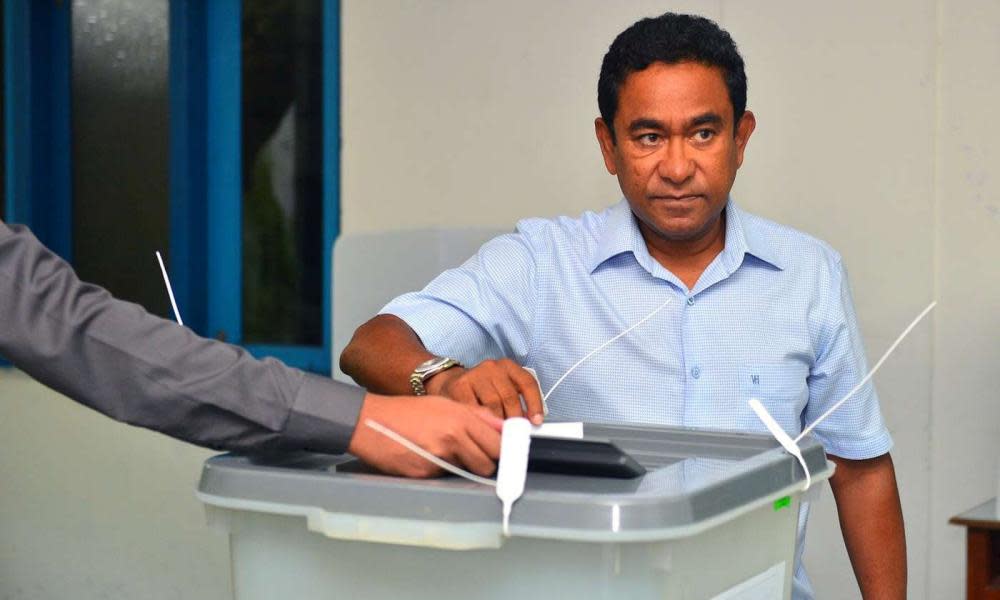Polls close in Maldives elections amid interference concerns

Polls have closed in the Maldives in presidential elections viewed as a referendum on the nascent democracy in the Indian Ocean archipelago.
Voting booths remained open an extra three hours due to an unprecedented turnout, after a muted election campaign in which opposition groups claim they were restricted from campaigning freely.
Police raided the offices of the opposition candidate on Saturday claiming to be investigating bribery, while a number of approved international observers say they were never issued visas, fanning fears among monitoring groups and western governments that there may be interference with the results.
President Abdulla Yameen is seeking a second term amid accusations his government is eroding civil liberties, jailing opponents and skimming millions of dollars from the country’s lucrative tourism industry.
Opposition groups in the islands have fielded a consensus candidate, Ibrahim Mohamed Solih, to oust the strongman leader, who they warn has taken unsustainable loans from China that leave the country open to interference from Beijing.
There were long lines all day on Sunday at polling booths in Malé and Addu – the two largest cities in the country of nearly 1,200 islands in 26 atolls – with voting slowed by intermittent power cuts in some areas. Turnout among the 263,000 eligible voters was higher than expected, monitoring groups in Malé said.
Accredited international observers contacted by the Guardian and Transparency Maldives, a local monitoring network, said there appeared to be no irregularities in the voting process.
Police raided Solih’s offices on Saturday afternoon. They claimed they were investigating “acts of bribery” intended to sway the presidential election, the third since 2008, when the country transitioned to democracy after four decades of autocratic rule.
A lawyer for the Maldivian Democratic party, the largest opposition group, told local media on Saturday evening the police had seized nothing from Solih’s fifth-floor office. Police said on Sunday they had found no evidence of any illegality at the premises.
Solih is a stalwart figure in the country’s politics but has a relatively low profile, and struggled for visibility in a campaign in which the state broadcaster lavished attention on Yameen and free media trod carefully in reporting opposition activity, fearful of attracting fines or criminal defamation charges.
The UK ambassador to the Maldives, James Dauris, said the raid on the candidate’s headquarters fuelled concerns about the legitimacy of Sunday’s polls. Robert Hilton, the interim chargé d’affaires for Sri Lanka and the Maldives at the US embassy in Colombo, said the police search “further calls into question the government’s commitment to a free and fair election”.
In view of events in #Maldives today it's easy to understand why so many people are concerned about what might happen on Election Day.
It would be a sad day for Maldivians and #democracy if tomorrow's vote were to be delayed. I share the hope it will go ahead, be free and fair.— James Dauris (@JamesDauris) September 22, 2018
Raid on opposition headquarters on the eve of the election further calls into question the government’s commitment to a free and fair election. The Maldivian people deserve a peaceful election free from manipulation and interference. #Maldives
— Robert Hilton (@HiltyBob) September 22, 2018
Yameen won the presidency in a disputed poll in 2013, one year after the country’s first democratically elected leader, Mohamed Nasheed, was forced to quit the office in what his supporters describe as a coup.
In the five years since, several opposition figures, including Nasheed, have been charged with terrorism offences and jailed or forced into exile. Onerous defamation laws have been introduced and media perceived to be critical of Yameen have been hit with exorbitant fines.
In February, the former civil servant Yameen declared a state of emergency and arrested two members of the country’s supreme court after judges quashed convictions against nine opposition leaders, clearing their way to run in this year’s elections.
Soon after the two judges were arrested, the remaining three members of the court voted to reinstate the convictions of the opposition leaders.
Opposition groups raised concerns last week about last-minute changes to counting procedure, which they said would make it harder to detect vote-rigging. The country’s state-controlled election commission said the amendments, including one meaning that scrutineers cannot raise complaints until after the official results are announced, would not change the way votes were counted.
On Friday, a number of international observers said that though they had been accredited to scrutinise the elections, they had yet to receive their visa. Among them were members of the the Asian Network for Free Elections, which said in a statement on Saturday the apparent denial of visas was the “latest sign of polling misconduct”.
“The political environment in the country is heavily tipped in favour of the ruling party, as critical media are being subdued into silence, and opposition figures sentenced to jail terms or forced into exile for politically motivated charges,” it said.
Yameen has shrugged off concerns he is abusing his power. “If the accusations about authoritarianism are true, when I go to islands, the people will tell me ‘we are tolerating so much abuse’,” he said during the campaign. “I won’t see smiles on the faces. No one will come to greet me and shake my hand, if there is tyranny.”
The US warned earlier in September it could apply sanctions against anyone seen to be impeding free and fair elections in the country. The European Union issued similar threats in July.
Polls closed at 7pm local time and the result was expected to be known before midnight.

 Yahoo News
Yahoo News 
